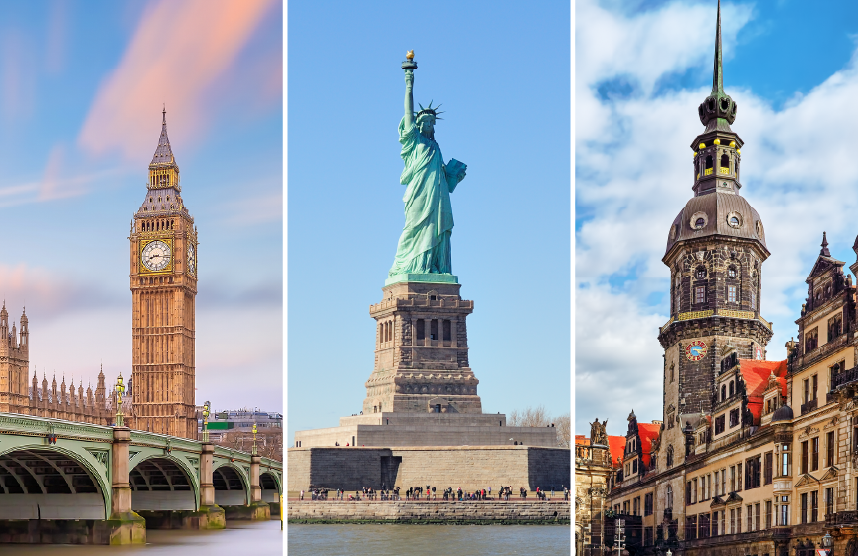Most Demanding Courses to Study Abroad in 2025: A Global Career Guide
Canada vs Ireland: Which Country is Best for Indian Students

When comparing destinations, both Canada and Ireland are excellent choices for Indian students. However, when deciding between the two, it is essential to consider factors such as the quality of education, employment opportunities, living costs, and cultural diversity. Each country offers unique advantages, making the choice between Canada vs Ireland for Indian students highly dependent on individual preferences and priorities.
In terms of the current global population, Canada is ranked third in terms of the percentage of international students it offers education to, and this information was obtained from the Canadian Bureau of International Education. Likewise, Ireland has emerged as a country favoured by Indian students.
Numerous programmes and research opportunities exist, and the country hosts numerous world-class universities. Canada also offers a Postgraduate Work Permit that enables students to get a work permit after completing their studies and further immigrating to the country. Huge cities such as Toronto or Vancouver are even more costly than small cities or towns.
At the same time, Ireland is steadily gaining popularity as its strong education backbone consistently develops fast-growing industries, including technology, business, and pharmaceutical fields. Irish universities are globally recognised for their high quality, and the country is safe with a focus on research and development.
Canada vs Ireland Highlights
Students are advised to check out the necessary information mentioned below before choosing either Canada or Ireland for Indian students:
| Information | Details |
|---|---|
| Top Universities In Canada | University of British Columbia University of Toronto McGill University |
| Top Universities In Ireland | Dublin City University Trinity College Dublin University College Dublin |
| Average Tuition Fees in Canada | INR 9L (CAD 14,822) – INR 50L (CAD 82,344) |
| Average Tuition Fees in Ireland | INR 3L (EUR 3,500) – INR 23L (EUR 25,600) |
| Top Courses in Canada | Health & Medicine IT & Computer Science Business Management |
| Top Courses in Ireland | Business Analytics Investment Banking & Finance Creative Writing Courses |
| Scholarships in Canada | Vanier Canada Graduate Scholarships Lester B. Pearson International Scholarships President’s International Scholarship of Excellence |
| Scholarships in Ireland | India Undergraduate Scholarships Trinity College Dublin Trinity College Dublin Global Excellence Postgraduate Scholarships University College Cork (UCC) Scholarships |
Canada vs Ireland for Indian Students: Popular Courses
Study in Ireland vs Study in Canada has diverse, rigorous options for Indian students. Ireland’s universities are well known for their business, biotechnology, and pharmaceutical courses.
Canadian universities, on the other hand, offered courses in business administration, engineering, computer science, and health care facilities. Occupations related to these sectors have been named among the well-paid jobs in Canada.
Canada vs Ireland: Differentiating courses based on popularity among Indian students
| Stream | Popular Courses in Ireland | Popular Courses in Canada |
|---|---|---|
| Engineering | Computer Science, Aeronautical Engineering, Mechanical Engineering, Biomedical Engineering, Environmental Engineering, Electrical and Electronic Engineering, Civil Engineering | Software Engineering, Biomedical Engineering, Civil Engineering, IT and Networking Engineering, Aerospace Engineering, Mechanical Engineering, Environmental Engineering |
| Hospitality | International Hotel Management, Hospitality Management, Tourism Management, Arts and Tourism, Airline Studies, Catering and Cooking, Hotel Administration, Tourism Destination Marketing | Culinary Management, Tourism and Hospitality Management, Event Planning, Resort and Hotel Management, Certificate in Global Tourism and Hospitality Management |
| Medical | Mental Health Nursing, Surgery and Obstetrics, Speech and Language Therapy, Immunology and Global Health, Medical Imaging, Kinesiology, Dentistry, Nutrition and Dietetics | Diploma in Paramedic, Cardiology Technologist, Diploma in Auxiliary Nursing Science, B.Sc Biotechnology, Occupational Therapy, Dental Medicine, Clinical Research |
| Humanities | Public History and Cultural Heritage, Digital Culture and Communications, History, Applied Linguistics, Modern English Literature, Creative Writing, Technical Writing, Applied Theology | Bachelor of Arts, History and Sociology, Literature, Political Science, History and Sociology, Theatre, Communication, Language, Media Studies |
| Management | Supply Chain Management, Digital Marketing Strategy, Financial Risk Management, Accounting, Business Analytics, Finance, Project Management | Project Management, MBA, Management Sciences, Digital Business, Finance, Marketing, Supply Chain Management, Global Business Administration, Social Economy and Co-operatives |
Canada vs Ireland for Indian Students: Eligibility Criteria
Can’t decide between Canada or Ireland for Master’s or Undergraduate programmes? Much depends on the average Gateway to qualify students and their counterparts in both countries.
Canada
- You should have completed twelve years of school education for the undergraduate programmes.
- You must write the SAT examination for the four-year degree programmes.
- There are diploma courses offered for two years.
- You will need GMAT scores for management programmes; GRE scores are necessary for engineering degrees.
- Cutoffs can only sometimes apply to colleges within this country.
- You must also present your scores on English proficiency tests, including IELTS and TOEFL.
Ireland
- For admission into any course at this university, at least 60% marks are required in the Class XII level examination.
- Diploma and foundation programmes are offered to students with a 50% pass.
- Students should have completed 18 years of education before they join degree programmes.
- The entry requirements for universities in Ireland are slightly eased, but the quality of education is generally high.
- Applications for places in UG courses are made through the CAO online application process, usually in December.
- IELTS/TOEFL is required, as is a bachelor’s diploma and its translation in certain cases, as well as a photocopy of the passport or its translation to English.
- For postgraduate courses, you must have a diploma or degree at the bachelor’s level and a subject relevant to the course being taken.
- You will also have to sit for scores on English language proficiency tests throughout your learning process.
Canada vs Ireland: Admission Requirement
Applying to a Canadian and Irish university can be challenging. Here, the prospectus of general admission requirements for both countries’ undergraduate and postgraduate programs and courses regarding necessary academic qualifications, requisite standard test scores, and other required documents has been included.
Entry Requirements in Canada
Undergraduate (UG) courses: Normally, they require the applicant to possess the GED or equivalent, a minimum GPA, and scores on a national or state test, such as the SAT or ACT. Other schools may also request that the applicant provide letters of recommendation and essays.
Postgraduate (PG) courses: Typically, a bachelor’s degree with a minimum GPA score and other standardised tests such as GRE, GMAT, etc. Some programmes can also include work experience or interviews.
Entry Requirements in Ireland
Undergraduate (UG) courses: Generally because of having a certain level of education, such as a High school diploma, minimum grade point average (GPA), and certain test scores like SAT/ACT. Some universities may also require letters of recommendation, essays, and student and university recommendations.
Postgraduate (PG) courses: Postgraduate (PG) courses usually require a minimum GPA and test scores, generally the GREs when students apply, but sometimes GMATS interviews or work experience might also be asked for by the universities.
Canada vs Ireland Cost of Living
The cost of living is also essential when selecting a place to live. Comparing living in Canada vs Ireland, it is comprehensible that both are well-developed countries with different advantages.
According to the country’s Factors Cost Index, the standard cost of living per single person, minus housing, equals 88,000 INR (CAD 1452). The other expenses that can be incurred for a single person in Ireland are INR 87,500 (EUR980).
Thus, let me emphasise that the major difference in the cost of living between these two countries is insignificant. Canada and Ireland can be described as countries with a preserved high quality of life, where students can have appreciable advantages when selecting the place to study abroad.
Here’s a table that compares the cost of living in Ireland vs Canada:
| Sections | Avg Cost in Canada | Avg Cost in Ireland |
|---|---|---|
| Mobile Phone | INR 4,000 (CAD 65.75) | INR 1,800 (EUR 20) |
| Internet | INR 5,200 (CAD 86) | INR 4,300 (EUR 48) |
| Transportation Monthly Pass | INR 6,400 (CAD 104) | INR 8,900 (EUR 100) |
| Basic Utilities | INR 13,000 (CAD 215) | INR 18,800 (EUR 211) |
| Rent in City Centre | INR 1.1L (CAD 1,911) | INR 1.46L (EUR 1,638) |
Canada vs Ireland: Student Visa
Ireland and Canada have rules for international students who want to enrol in foreign colleges and universities.
Canada
Here, therefore are the regulations governing the Canadian student visa –
- You must obtain a post-graduation work visa within 180 days of course completion.
- There is a visa application for which Indians must undergo a medical test before being allowed into Canada.
- Married people can also work full-time; their tenure is one year or more.
- Applying for this visa requires CAD 150.
- The earnings restrictions include a maximum weekly work limit of 20 hours. The student may work full-time during holidays, breaks, summer sessions, or other university vacations.
Ireland
- Foreign students intending to take a course in Ireland for over three months must obtain an Ireland Study Visa.
- One of the conditions introduced was that applicants had to demonstrate that they had € 7,000 available in their bank account when applying for the study visa. This amount would cover what it costs an international student like myself to live in Ireland for one academic year.
- Besides, you must show that you or your parents/sponsor can cover at least €7000 for each year of further schooling besides the course cost.
- If you have a valid stamp 2, you will be allowed to work 20 hours per week during the academic session and 40 hours per week during the academic year, which is May, June, July, and August.
- You can also work 40 hours per week between 15 December and 15 January when preparing for the next semester. These are the vacation times in Ireland, so the time allowed for work expands during the vacations.
Canada vs Ireland: Popular Jobs
After getting their degrees, most students look forward to finding a job in their home country. This section aims to show the leading Canadian and Irish job markets with average salary scales for several occupations.
| Section | Canada Monthly Avg. Salary | Ireland Monthly Avg. Salary |
|---|---|---|
| Software Engineer | CAD 6,000 – 8,000 | EUR 4,000 – 5,500 |
| Data Scientist | CAD 5,500 – 7,500 | EUR 3,500 – 4,500 |
| Accountant | CAD 4,500 – 6,000 | EUR 3,000 – 4,000 |
| Nurse | CAD 4,000 – 5,500 | EUR 2,500 – 3,500 |
Scholarships to Study in Canada and Ireland
Students are advised to check out the scholarship scenario to study in Canada and Ireland for Indian students:
Canada
It is understood that fewer popular scholarships are provided to international students in Canada than in other countries. The reason behind this is the low tuition fees at colleges. Because only a few students in Canada pay the lowest tuition fees, colleges and organisations only offer a few scholarships in Canada.
- Vanier Canada Graduate Scholarships
- Lester B. Pearson International Scholarships
- President’s International Scholarship of Excellence
- Ontario Graduate Scholarship (OGS)
- University of British Columbia Scholarships for International Students.
Ireland
Over the years, Ireland has become among the best countries where most students worldwide wish to study. The country, together with Irish universities, has launched several scholarships to encourage the flow of foreign nationals into education.
- India Undergraduate Scholarships- Trinity College Dublin
- Trinity College Dublin Global Excellence Postgraduate Scholarships
- University College Cork (UCC) Scholarships
- National University of Ireland, Galway (NUIG) Scholarships
- UCD GLOBAL EXCELLENCE SCHOLARSHIPS
Conclusion
Deciding between the two countries, primarily Ireland and Canada, is tough. The two countries have growing economies, and many institutions have been ranked high. While the cost of living is a tad lower, getting a permanent residency here in Canada is easier than in other countries. It also has slightly lower taxes. The overall cost of manufactured goods may not differ significantly between the two.
However, it has its advantages – at least in some cases, the fees are lower there than in Britain, there are also scholarships, and the opportunities for finding work after graduating from an Irish university are brilliant. So, depending on those needs, let us look at the conditions distinguishing Ireland from Canada.
Frequently Asked Questions
According to numerous research studies, the costs in Canada are lower than those in Ireland by 9.6% in the mean. However, these costs are higher than this country's cost of living by 26%. This means you will spend a relatively small amount remaining in Canada.
It is a matter of personal opinion to answer. Ireland has friendly people, a good economy, jobs, scholarships, and free health care, some of which are paid for by the government. Canada provides state-funded health care, where patients contribute a trifling fee acceptable for minor out-of-hospital medical centres and facilities.
People from India migrate to Ireland mainly to further their education. Ireland has some of the best universities, and more students study science and technology there. Also, the emergence of successful start-up technology firms in places like Dublin raises employment opportunities. Other factors that attract Indian professionals and students include friendly immigration laws and a high standard of living.



















































